
Is privacy important? Just check Facebook’s stock price
Your data privacy is important to you, to us, to anyone conscious of their digital footprint. But just how important is harvesting and tracking your data to the tech industry?
Look no further than Facebook’s stock price to answer that question. Earlier this month, Meta (the parent company of Facebook and Instagram) lost $240 billion in market value—more than 25% of the company—in just one day, when they revealed the impact of Apple’s new consumer-friendly privacy changes on its core advertising business. It was the biggest single-day market cap loss in U.S. history.
All the data that big companies like Meta and Google collect on you—along with the targeted advertising opportunities it presents—are a big portion of those companies’ revenue. In fact, platforms like Facebook and Instagram make a large chunk of their profit from selling user data to advertisers and marketers, who rely on consumer data tracked across one’s digital footprint to target ads, promotions, and messaging. In short, there’s a price exacted for using free online platforms, and that price is often your data.
Apple’s latest digital privacy measures—giving their smartphone and computer users the option to block cookies on their devices—will likely reduce Meta’s revenue by $10 billion in 2022 alone and present financial challenges at other big platforms like Snap and Pinterest.
It all hinges on what are commonly called “cookies,” small tags on personal data used by web servers to track internet users. They allow websites to collect and store everything from usernames and passwords to online shopping habits. That information can in turn be sold to online marketers and advertising firms, which have made targeted digital advertising their bread and butter in the internet age, to the tune of a $350 billion industry.
But as consumer demands for more privacy grow louder, government regulators are getting bolder and some companies are strengthening protections. Slowly but surely, the very structure of the industry is changing.
As Eric Seufert, author of a blog on mobile advertising, told the New York Times for a Feb. 3 article: “People can’t really be targeted the way they were before… That breaks the model. It’s not just an inconvenience that can be fixed with a couple of tweaks. It requires rebuilding the foundation of the business.”
In addition to the hit on its stock price and revenues, Meta announced it may have to pull out of the European market as well, thanks to new privacy rules enacted by the European Union. And with Google likely to follow Apple in enhancing privacy protections by 2023, the digital advertising sector may have to find ways to make do without your individual data.
This is good news for privacy-conscious internet users. But it’s bad news for the companies that have made their money on your data.
These changes don’t mean you can browse the web anonymously. Far from it—it highlights the extent to which collecting your data has fueled the growth of internet companies, and will, in all likelihood, continue to do so in the future in some shape or form.
What it does mean, however, is that consumers will likely be given more and more rights to protect their privacy. But companies won’t make it easy to exercise those rights.
With Confidently, you can protect your digital privacy, remove your data from hundreds of websites, and shrink your digital footprint, protecting you from unwanted advertising, spam, data breaches and leaks, and more.
Subscribe today to protect your online privacy—with or without changes from big tech.

Subscribe